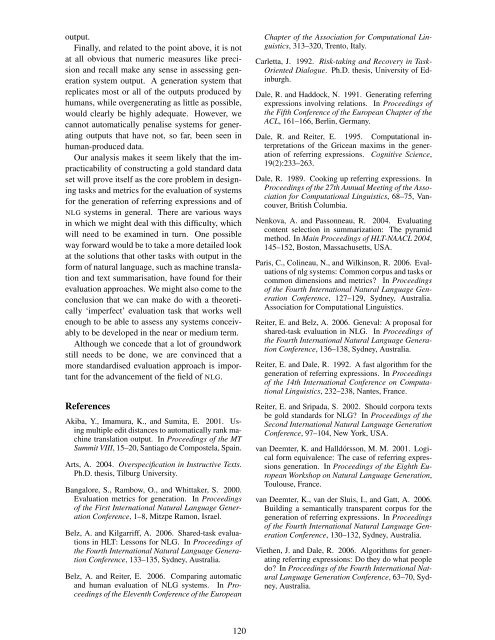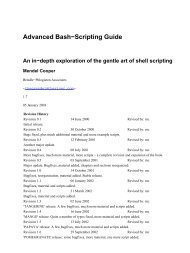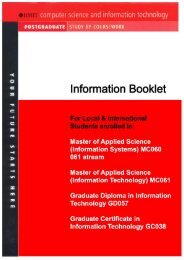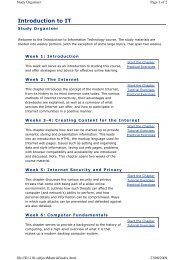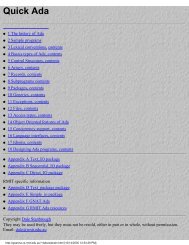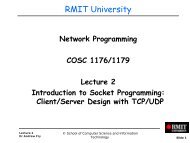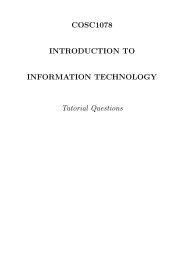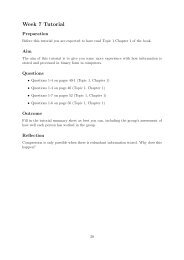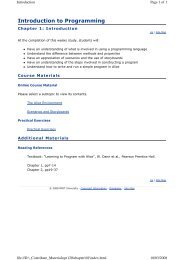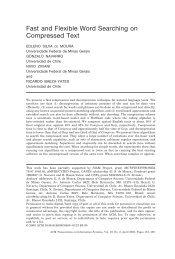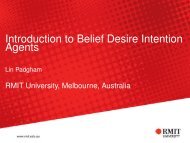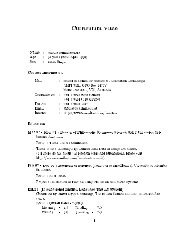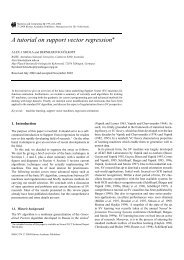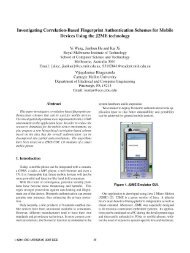Automatic Mapping Clinical Notes to Medical - RMIT University
Automatic Mapping Clinical Notes to Medical - RMIT University
Automatic Mapping Clinical Notes to Medical - RMIT University
Create successful ePaper yourself
Turn your PDF publications into a flip-book with our unique Google optimized e-Paper software.
output.<br />
Finally, and related <strong>to</strong> the point above, it is not<br />
at all obvious that numeric measures like precision<br />
and recall make any sense in assessing generation<br />
system output. A generation system that<br />
replicates most or all of the outputs produced by<br />
humans, while overgenerating as little as possible,<br />
would clearly be highly adequate. However, we<br />
cannot au<strong>to</strong>matically penalise systems for generating<br />
outputs that have not, so far, been seen in<br />
human-produced data.<br />
Our analysis makes it seem likely that the impracticability<br />
of constructing a gold standard data<br />
set will prove itself as the core problem in designing<br />
tasks and metrics for the evaluation of systems<br />
for the generation of referring expressions and of<br />
NLG systems in general. There are various ways<br />
in which we might deal with this difficulty, which<br />
will need <strong>to</strong> be examined in turn. One possible<br />
way forward would be <strong>to</strong> take a more detailed look<br />
at the solutions that other tasks with output in the<br />
form of natural language, such as machine translation<br />
and text summarisation, have found for their<br />
evaluation approaches. We might also come <strong>to</strong> the<br />
conclusion that we can make do with a theoretically<br />
‘imperfect’ evaluation task that works well<br />
enough <strong>to</strong> be able <strong>to</strong> assess any systems conceivably<br />
<strong>to</strong> be developed in the near or medium term.<br />
Although we concede that a lot of groundwork<br />
still needs <strong>to</strong> be done, we are convinced that a<br />
more standardised evaluation approach is important<br />
for the advancement of the field of NLG.<br />
References<br />
Akiba, Y., Imamura, K., and Sumita, E. 2001. Using<br />
multiple edit distances <strong>to</strong> au<strong>to</strong>matically rank machine<br />
translation output. In Proceedings of the MT<br />
Summit VIII, 15–20, Santiago de Compostela, Spain.<br />
Arts, A. 2004. Overspecification in Instructive Texts.<br />
Ph.D. thesis, Tilburg <strong>University</strong>.<br />
Bangalore, S., Rambow, O., and Whittaker, S. 2000.<br />
Evaluation metrics for generation. In Proceedings<br />
of the First International Natural Language Generation<br />
Conference, 1–8, Mitzpe Ramon, Israel.<br />
Belz, A. and Kilgarriff, A. 2006. Shared-task evaluations<br />
in HLT: Lessons for NLG. In Proceedings of<br />
the Fourth International Natural Language Generation<br />
Conference, 133–135, Sydney, Australia.<br />
Belz, A. and Reiter, E. 2006. Comparing au<strong>to</strong>matic<br />
and human evaluation of NLG systems. In Proceedings<br />
of the Eleventh Conference of the European<br />
120<br />
Chapter of the Association for Computational Linguistics,<br />
313–320, Tren<strong>to</strong>, Italy.<br />
Carletta, J. 1992. Risk-taking and Recovery in Task-<br />
Oriented Dialogue. Ph.D. thesis, <strong>University</strong> of Edinburgh.<br />
Dale, R. and Haddock, N. 1991. Generating referring<br />
expressions involving relations. In Proceedings of<br />
the Fifth Conference of the European Chapter of the<br />
ACL, 161–166, Berlin, Germany.<br />
Dale, R. and Reiter, E. 1995. Computational interpretations<br />
of the Gricean maxims in the generation<br />
of referring expressions. Cognitive Science,<br />
19(2):233–263.<br />
Dale, R. 1989. Cooking up referring expressions. In<br />
Proceedings of the 27th Annual Meeting of the Association<br />
for Computational Linguistics, 68–75, Vancouver,<br />
British Columbia.<br />
Nenkova, A. and Passonneau, R. 2004. Evaluating<br />
content selection in summarization: The pyramid<br />
method. In Main Proceedings of HLT-NAACL 2004,<br />
145–152, Bos<strong>to</strong>n, Massachusetts, USA.<br />
Paris, C., Colineau, N., and Wilkinson, R. 2006. Evaluations<br />
of nlg systems: Common corpus and tasks or<br />
common dimensions and metrics? In Proceedings<br />
of the Fourth International Natural Language Generation<br />
Conference, 127–129, Sydney, Australia.<br />
Association for Computational Linguistics.<br />
Reiter, E. and Belz, A. 2006. Geneval: A proposal for<br />
shared-task evaluation in NLG. In Proceedings of<br />
the Fourth International Natural Language Generation<br />
Conference, 136–138, Sydney, Australia.<br />
Reiter, E. and Dale, R. 1992. A fast algorithm for the<br />
generation of referring expressions. In Proceedings<br />
of the 14th International Conference on Computational<br />
Linguistics, 232–238, Nantes, France.<br />
Reiter, E. and Sripada, S. 2002. Should corpora texts<br />
be gold standards for NLG? In Proceedings of the<br />
Second International Natural Language Generation<br />
Conference, 97–104, New York, USA.<br />
van Deemter, K. and Halldórsson, M. M. 2001. Logical<br />
form equivalence: The case of referring expressions<br />
generation. In Proceedings of the Eighth European<br />
Workshop on Natural Language Generation,<br />
Toulouse, France.<br />
van Deemter, K., van der Sluis, I., and Gatt, A. 2006.<br />
Building a semantically transparent corpus for the<br />
generation of referring expressions. In Proceedings<br />
of the Fourth International Natural Language Generation<br />
Conference, 130–132, Sydney, Australia.<br />
Viethen, J. and Dale, R. 2006. Algorithms for generating<br />
referring expressions: Do they do what people<br />
do? In Proceedings of the Fourth International Natural<br />
Language Generation Conference, 63–70, Sydney,<br />
Australia.


